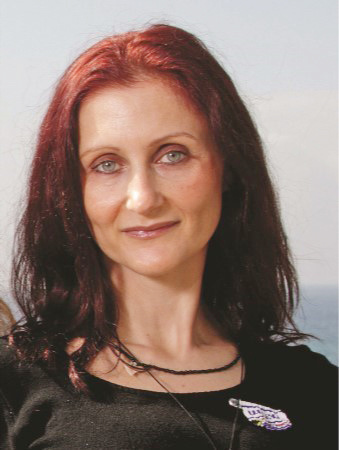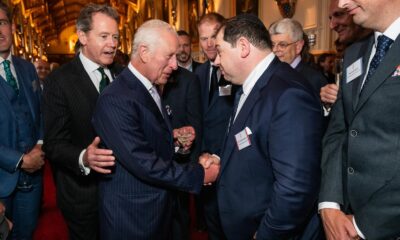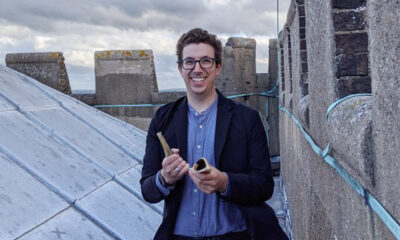
OpEds

The Jew-el in the coronation of King Charles III
Vivat Rex! A king has been crowned! Seventy years after the historic coronation of his late mother, Queen Elizabeth II, King Charles was crowned in Westminster Abbey this past Saturday. Forty monarchs have been crowned in the medieval abbey, and the scenes on Saturday were simply spectacular. The Carolean era has arrived.
The ornate architecture lent itself to the solemn, spiritual ceremony, which had many beautiful moments. From the ancient ritual of adorning the monarch with his symbols of state – the super tunica, spurs, sword, bracelets, orb and sceptre – to the sartorial splendour of the guests (a special nod here to Princesses Catherine and Charlotte, and Anne, with her feather doing double duty as an obscurer of wayward princes), and the intoning of blessings, the coronation was spectacular.
There were many emotional moments as well. The king’s heir, the Prince of Wales, pledging to be “liegeman of life and limb” and gently kissing his father on the cheek had many, including his majesty, misty eyed with emotion. The magnificent singing of Handel’s Zadok the Priest; the moment the crown was placed on the king’s head; the familiar words of the blessing of the high priests, the Kohanim; the military parades to and from the abbey; were Britain at its best. Not to mention the iconic balcony scene at Buckingham Palace and the roaring cheers of massive crowds.
A coronation is an event of great constitutional and spiritual significance. Britain is a constitutional monarchy, and though the king may have no real power, heavy is the head who wears the crown. King Charles has a clear idea of what kind of reign he intends to have. Having served the longest apprenticeship in history, he’s ready.
“I come not to be served, but to serve,” were the stirring words of the king’s prayer, which opened the ceremony. This is what monarchy is all about. It’s not about the castles, jewels, and ermine robes (although those are fabulous) but duty, service, and responsibility, qualities which Queen Elizabeth II exemplified.
Known to be a deeply spiritual man with a keen interest in various religions, King Charles has always vowed that he would be a “defender of faith”. As king, he is the head of the Church of England but is well aware that the United Kingdom of 2023 is vastly different to that of 1953. His deep commitment to religious diversity was reflected in the multifaith representatives present at the coronation.
Centuries ago, following the coronation of King Richard I, Jews were killed in a pogrom after many prominent English Jews arrived at Westminster Abbey to pay homage to their new king. Many Christian Englishmen harboured superstitions against Jews being present at such a holy occasion, and the Jewish attendees were flogged and thrown out of the banquet following the coronation. After the incident at Westminster Abbey, a rumour spread that Richard had ordered the English to kill the Jews. Christians attacked the predominantly Jewish neighbourhood of Old Jewry, setting the stone houses on fire at night and killing those who tried to escape. Hundreds of years later, Jews were very much a part of the honoured proceedings.
The chief rabbi of the United Kingdom, Rabbi Ephraim Mirvis, who quite possibly made more media appearances than royal correspondents last week, spoke proudly about how Jews would be included in the service, including blessing the king as he left the abbey. There was special consideration for the laws of Shabbat and as such, a microphone wasn’t used. The rabbi and his wife had spent Shabbat at St James Palace at the invitation of the king so that he could walk to the abbey. A rabbi and a president walk into a church – this wasn’t the opening of a joke but the reality on Saturday, when President Isaac Herzog and First Lady Michael also walked to the abbey so that they didn’t break Shabbat.
The holiest and most intimate part of the service is the anointing. King Charles, stripped of ornate robes and clad in a modest linen shift (and looking quite vulnerable), was hidden behind a magnificent screen embroidered with the names of the Commonwealth countries and was anointed with holy oil pressed from olives in the Church of Mary Magdalene and blessed at the Church of the Holy Sepulchre in Jerusalem. “Zadok the priest and Nathan the prophet anointed Solomon the king, and the people rejoiced,” sang the choir.
Then it was time to hand the king the accoutrements of state.
Baroness Merron, representing the Jewish community, presented the king with the Imperial Robe Royal – the robes of righteousness and salvation.
After a lengthy service, the newly crowned king and queen slowly made their way out of the abbey. At the exit, Rabbi Mirvis, joined by representatives of other faiths, quietly bestowed blessings – quietly because microphones weren’t used out of respect for the rabbi’s observation of Shabbat.
Jews have had a long and complicated relationship with the royal family over the centuries, and it has only improved throughout the past few reigns. The message was loud and clear during the coronation: Jews aren’t just an integral part of British society, the monarchy deeply honours and respects our customs and traditions. G-d save the king!
- Rolene Marks is the “SA Jewish Report’s” royal correspondent based in the Middle East.










